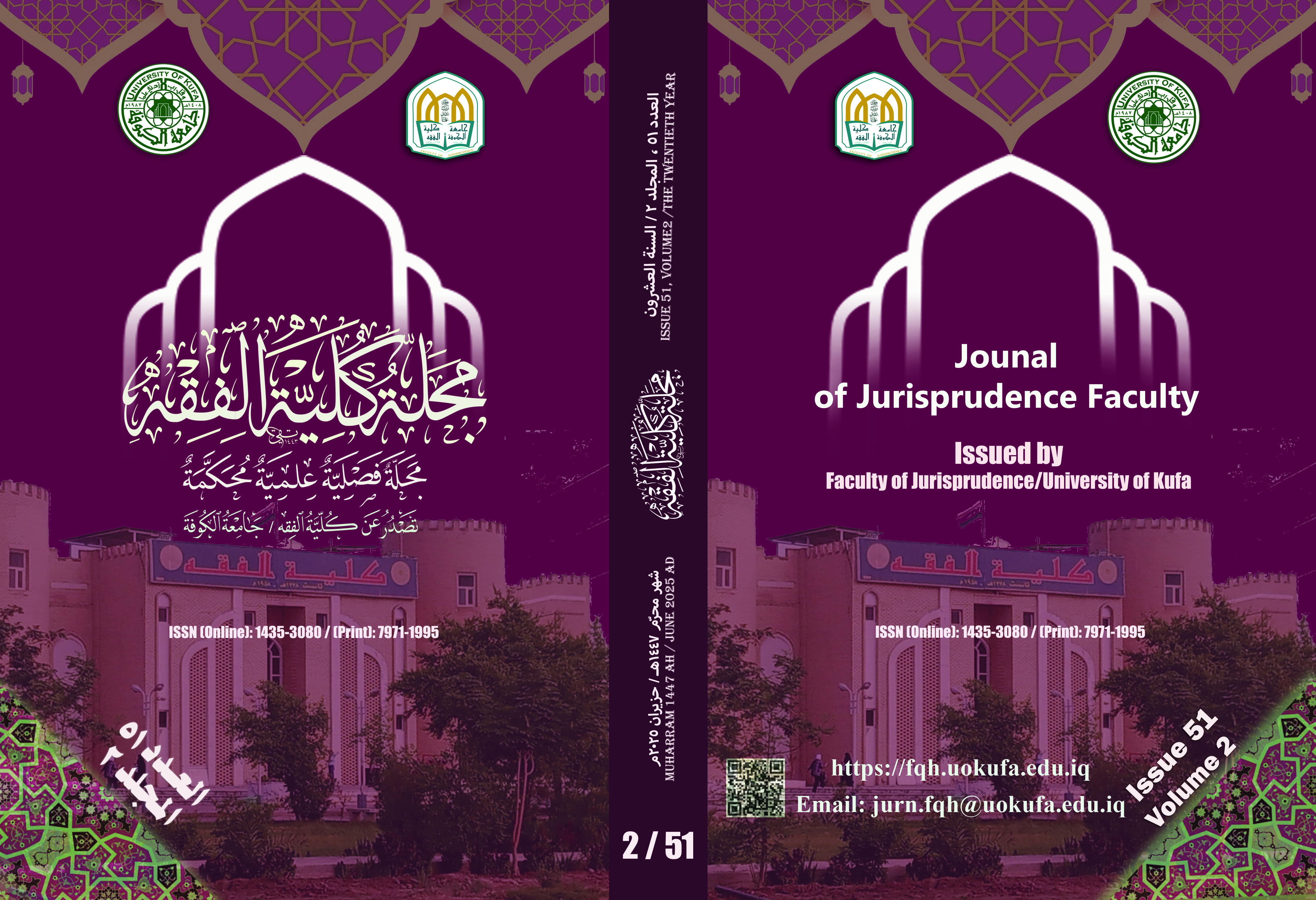Abstract
Jurisprudential results are influenced by the general rules applicable to the particular issue. The disagreement among jurists and legal theorists regarding a particular rule result in differing conclusions.
One of these rules is the rule of using a word in more than one sense. Legal theorists have differed regarding the possibility and impossibility of such a use. Those who believe in impossibility often insist that a text does not indicate a legal ruling, as this is the use of a word in more than one sense, which, in their view, is impossible.
Those who believe in possibility can cite a jurisprudential text on a jurisprudential issue as evidence of a legal ruling for another issue by establishing circumstantial evidence of multiple uses. Furthermore, the existence of Quranic narrations has opened the door to research into the possibility of this use in the Holy Quran.
The research concluded that the use of a word in more than one sense is in itself possible, contrary to the opinion of Al-Muhaqqiq Al-Akhund (may God sanctify his secret) and in agreement with Sayyid Al-Khoei (may God sanctify his secret) and a number of jurists. It also resulted in the conclusion that the Qur\'anic verses are an application of this rule, contrary to the view of Al-Muhaqqiq Al-Akhund and Sayyid Al-Khoei (may God sanctify their secrets).
The best evidence for possibility is occurrence, as can be found in an analysis of the Almighty\'s statement: \"Indeed, it is a noble Qur\'an in a protected Book which none shall touch except the purified.\" Jurists and commentators have adhered to its indication of two opposing meanings that cannot be reconciled except by stating that the word can be used in more than one sense.
One of these rules is the rule of using a word in more than one sense. Legal theorists have differed regarding the possibility and impossibility of such a use. Those who believe in impossibility often insist that a text does not indicate a legal ruling, as this is the use of a word in more than one sense, which, in their view, is impossible.
Those who believe in possibility can cite a jurisprudential text on a jurisprudential issue as evidence of a legal ruling for another issue by establishing circumstantial evidence of multiple uses. Furthermore, the existence of Quranic narrations has opened the door to research into the possibility of this use in the Holy Quran.
The research concluded that the use of a word in more than one sense is in itself possible, contrary to the opinion of Al-Muhaqqiq Al-Akhund (may God sanctify his secret) and in agreement with Sayyid Al-Khoei (may God sanctify his secret) and a number of jurists. It also resulted in the conclusion that the Qur\'anic verses are an application of this rule, contrary to the view of Al-Muhaqqiq Al-Akhund and Sayyid Al-Khoei (may God sanctify their secrets).
The best evidence for possibility is occurrence, as can be found in an analysis of the Almighty\'s statement: \"Indeed, it is a noble Qur\'an in a protected Book which none shall touch except the purified.\" Jurists and commentators have adhered to its indication of two opposing meanings that cannot be reconciled except by stating that the word can be used in more than one sense.
Keywords
Islam
jurisprudence
meaning
Qur'an
Usage
word
Abstract
تتأثر النتائج الفقهية بالقواعد العامة الجارية في المسألة الجزئية ، فاختلاف الفقهاء و الأصوليين في قاعدة ما ينتج عنه اختلاف النتائج التي يتوصلون إليها.
ومن هذه القواعد قاعدة استعمال اللفظ في أكثر من معنى ، فقد اختلف الأصوليون في إمكان ذلك الاستعمال واستحالته ، فالقائلون بالاستحالة كثيرا ما يلتزمون بعدم دلالة النص على الحكم الشرعي لانه من استعمال اللفظ في أكثر من معنى وهو بنظرهم شيء مستحيل .
والقائلون بالإمكان يمكن أن يستدلوا بنص فقهي وارد في مسألة فقهية على حكم شرعي لمسألة أخرى من خلال إقامة قرينة دالة على تعدد الاستعمال. كما أن وجود روايات البطون القرآنية فتح الباب واسعا للبحث في إمكانية وجود هذا الاستعمال في القران الكريم.
ونتج عن البحث إن استعمال اللفظ في أكثر من معنى ممكن في نفسه خلافا للمحقق الاخوند قدس سره ووفاقا للسيد الخوئي قدس سره وجملة من الفقهاء .
كما نتج عنه أن البطون القرآنية هي تطبيق لهذه القاعدة خلافا للمحقق الاخوند والسيد الخوئي قدس سرهما .
وافضل دليل للامكان هو الوقوع وذلك من خلال تحليل قوله تعالى: ( إنه لقران كريم في كتاب مكنون لا يمسه الا المطهرون ) فقد التزم الفقهاء والمفسرون بدلالتها على معنيين متضادين لايمكن الجمع بينهما إلا بالقول بإمكان استعمال اللفظ في أكثر من معنى.
ومن هذه القواعد قاعدة استعمال اللفظ في أكثر من معنى ، فقد اختلف الأصوليون في إمكان ذلك الاستعمال واستحالته ، فالقائلون بالاستحالة كثيرا ما يلتزمون بعدم دلالة النص على الحكم الشرعي لانه من استعمال اللفظ في أكثر من معنى وهو بنظرهم شيء مستحيل .
والقائلون بالإمكان يمكن أن يستدلوا بنص فقهي وارد في مسألة فقهية على حكم شرعي لمسألة أخرى من خلال إقامة قرينة دالة على تعدد الاستعمال. كما أن وجود روايات البطون القرآنية فتح الباب واسعا للبحث في إمكانية وجود هذا الاستعمال في القران الكريم.
ونتج عن البحث إن استعمال اللفظ في أكثر من معنى ممكن في نفسه خلافا للمحقق الاخوند قدس سره ووفاقا للسيد الخوئي قدس سره وجملة من الفقهاء .
كما نتج عنه أن البطون القرآنية هي تطبيق لهذه القاعدة خلافا للمحقق الاخوند والسيد الخوئي قدس سرهما .
وافضل دليل للامكان هو الوقوع وذلك من خلال تحليل قوله تعالى: ( إنه لقران كريم في كتاب مكنون لا يمسه الا المطهرون ) فقد التزم الفقهاء والمفسرون بدلالتها على معنيين متضادين لايمكن الجمع بينهما إلا بالقول بإمكان استعمال اللفظ في أكثر من معنى.
Keywords
لفظ، معنى، استعمال، القرآن، الإسلام، الفقه
